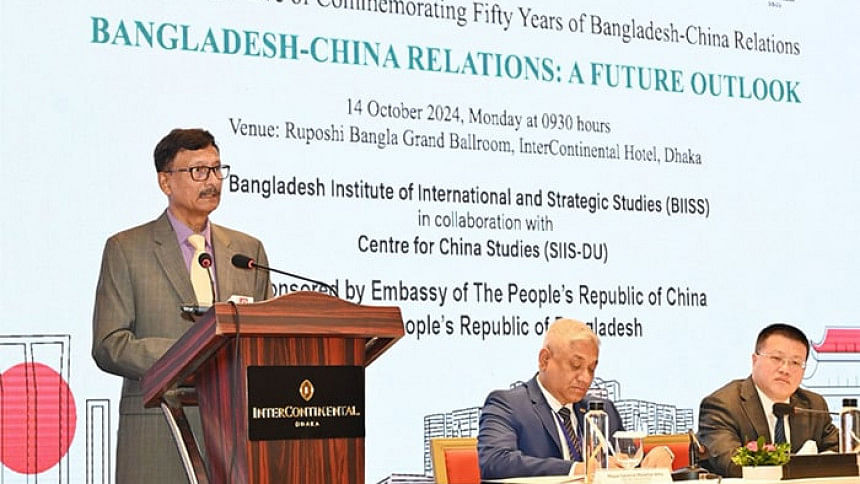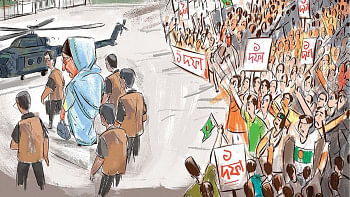Dhaka seeks to enhance economic, security cooperation with Beijing

Foreign Adviser M Touhid Hossain yesterday said Dhaka is keen on strengthening economic and security cooperation with China and deepening collaboration in several critical areas, including clean energy and infrastructure development.
"We need security cooperation from China," he said while speaking at a seminar at a city hotel titled "Bangladesh-China Relations: A Future Outlook".
Bangladesh Institute of International and Strategic Studies (BIISS) and the Centre for China Studies (SIIS-DU) jointly organised the seminar, with Dhaka and Beijing set to celebrate the 50th anniversary of their diplomatic relations next year.
Underlining the significance of defence cooperation with China, the foreign adviser noted that China is a major supplier of security equipment to Bangladesh and a key partner in modernising Bangladesh's military.
Dhaka looks forward to further strengthening the cooperation, especially in the military training programmes, he said.
He also said that enhanced defence cooperation could play a role in increasing Bangladesh's involvement in the United Nations peacekeeping operations, which remains a key priority for the country.
Touhid welcomed further cooperation in infrastructure development and energy projects, particularly in green energy, emphasising the completion of projects on time.
He emphasised technological cooperation, including in the ICT sector. The development of Bangladesh's ICT sector with Chinese technological transfer could be one of the main drivers of Bangladesh's economic growth in the coming years.
The foreign adviser said Dhaka looks forward to seeing a more proactive role from Beijing in the safe repatriation of the Rohingyas to Myanmar with their rights, and security ensured.
"We appreciate China's cooperation, but unfortunately, the trilateral dialogue has not yet succeeded in returning even one Rohingya (in the last seven years)," he said.
As Bangladesh and China approach the 50th anniversary of their diplomatic relations, the foreign adviser expressed optimism about the future.
Bangladesh's political and economic trajectory will shape the direction of its relationship with China, Touhid remarked.
He said the future of Bangladesh-China bilateral ties depends on various factors, including regional and global political dynamics.
"We need meaningful cooperation from China, and new avenues of collaboration must be explored by both sides," he said.
Chinese Ambassador to Bangladesh Yao Wen and Chair of the Committee on White Paper on the State of Bangladesh's Economy Dr Debapriya Bhattacharya were present as special guests.
Director of the Academic Advisory Council, SIIS Professor Dr Yang Jiemian, and BISS Director General Major General Iftekhar Anis also delivered speeches in the seminar presided over by BISS Chairman Ambassador AFM Gousal Azam Sarker.
The Chinese ambassador said Bangladesh has recently experienced significant political transformations and is now at a critical historical juncture.
"As a comprehensive strategic cooperative partner, China firmly supports the interim government in its endeavours for state reforms, maintaining law and order, promoting economic development, and improving the livelihoods of the people," he said.
Referring to his recent interactions with government officials, political parties, and various sectors of society, the envoy said he witnessed firm commitment from Bangladeshi people to China-Bangladesh friendship and their support for developing bilateral relations.
"They believe that our two countries are now facing significant historical opportunities for deeper cooperation," he said.
The ambassador said China supports Bangladesh in becoming a partner country of the BRICS mechanism and a dialogue partner of ASEAN.
"China is willing to contribute to the repatriation of the Rohingyas and work closely with Bangladesh on international and regional affairs, strengthening coordination and cooperation within the United Nations and other multilateral frameworks," he said.
Debapriya Bhattacharya urged Chinese companies to invest in Bangladesh's Chinese Economic and Industrial Zone.
Such investments are essential for making the Karnaphuli Tunnel an economically viable catalyst for enhanced economic cooperation between Bangladesh and China.
The seminar had three working sessions, with the first titled "The Impact of Bangladesh's Changing Political Landscape on Regional Dynamics" was moderated by former Foreign Secretary Ambassador Farooq Sobhan.
The second working session titled "Bangladesh's Political, Economic, and Social Reforms and the Trends" was moderated by Zhang Jiuan, associate research fellow at the Academy of Contemporary China and World Studies.
Dhaka University's international relations Professor Amena Mohsin moderated the third working session titled "Strengthening China- Bangladesh Cooperation and Advancing the Comprehensive Strategic Cooperative Partnership".
The speakers noted that Bangladesh-China cooperation has evolved in many ways and economic ties are the cornerstone of the relationship.
They commended China's status as Bangladesh's largest trade partner and highlighted several key initiatives undertaken by China to enhance Bangladesh's export capabilities.

 For all latest news, follow The Daily Star's Google News channel.
For all latest news, follow The Daily Star's Google News channel. 



Comments